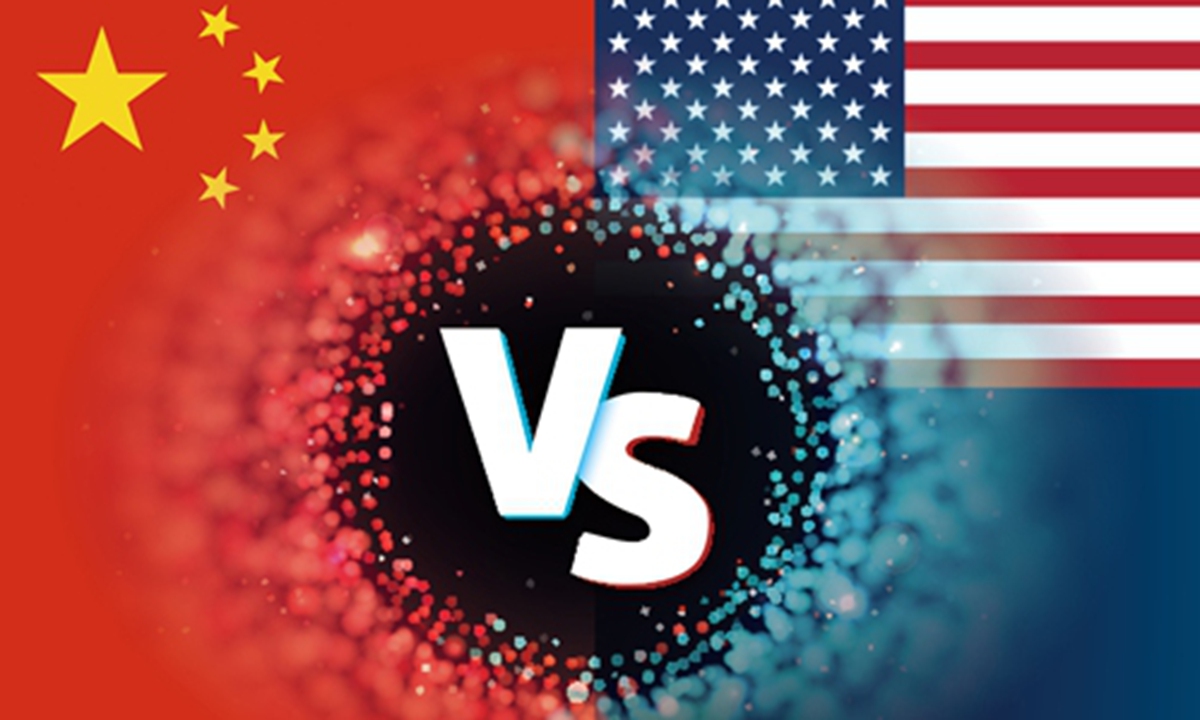'Reciprocal sanctions' in NPC's high-level warning likely apply to Pompeo, anti-China congressmen
By Yang Sheng and Wang Qi Source: Global Times Published: 2020/12/9 20:09:19 Last Updated: 2020/12/9 23:14:16

China US Photo: GT
A spokesperson of the Standing Committee of the 13th National People's Congress (NPC) on Wednesday slammed the US for its brutal and despicable sanctions on top officials of China's top legislature over the national security law for Hong Kong, the highest-level warning to the US since 1999.
"The US grossly interferes in China's internal affairs under the pretext of Hong Kong affairs, which is despicable. It is a typical case of political bullying and double standards. We strongly condemn it and firmly oppose it," said the spokesperson.
The NPC's previous responses related to Hong Kong affairs were usually from its foreign affairs committee.
Analysts believed the message sent from China's top legislature to the US is the highest-level expression of condemnation to the US since the 1999 NATO bombing of the Chinese Embassy in Belgrade.
In 1999, Hu Jintao, then Chinese vice president, delivered a nationally televised speech to condemn the US bombing, which killed three Chinese journalists in the embassy to the former Yugoslavia. Observers said this means the provocation that the US has made this time is as serious as the bombing of the embassy, and China will and must take unprecedented action to respond.
China will impose reciprocal sanctions on relevant US personnel who put forward and promote the agenda related to Hong Kong, interfere in Hong Kong affairs and undermine China's sovereign security, the spokesperson said.
Chinese analysts said there are many senior officials in the Trump administration who fit into this category of "reciprocal sanctions," including Secretary of State Mike Pompeo and some in the US Congress who have a stubborn anti-China stance and have passed bills to interfere in Hong Kong affairs.
US authorities announced on Monday that the country was imposing sanctions on 14 individuals - all vice chairpersons of the 13th NPC Standing Committee - over Hong Kong affairs. The move came after the NPC made a decision in November to disqualify four Hong Kong opposition lawmakers, who had infamous records for making trouble and were deemed unfit for their Hong Kong Legislative Council duties.
The unusual high-level warning is more authoritative, showing China's firm stance, and a warning to the US government not to assume that sanctions against Chinese officials would come at no cost, Li Haidong, a professor at the Institute of International Relations of the China Foreign Affairs University, told the Global Times.
The NPC's previous responses related to Hong Kong affairs were usually from its foreign affairs committee.
Hong Kong affairs are purely China's internal affairs. China's Constitution and the Basic Law of the Hong Kong Special Administrative Region together form the constitutional basis of Hong Kong, the spokesperson said.
The NPC authorizes the HKSAR to practice "one country, two systems," "Hong Kong people administer Hong Kong" and a high degree of autonomy in accordance with the Provisions of the Basic Law. the national security law for Hong Kong was enacted to safeguard China's sovereignty, security and development interests, as well as prevent and punish acts and activities endangering national security, and ensure the long-term stability and prosperity of Hong Kong, the spokesperson said.
China is firmly determined to safeguard its national sovereignty, security and development interests, and firmly determined to implement "one country, two systems" and to oppose interference in Hong Kong affairs by any outside force, said the spokesperson.
China is very likely to impose sanctions on some members of US Congresses and senior officials in the Trump administration, even though the administration has only a few weeks left in the White House, said Li.
"The response is also a reminder to the next US administration not to undermine China-US relations and create conflicts like the Trump administration," said Li, noting that China needs to be wary of Washington no matter who takes office in the White House.
Posted in: DIPLOMACY